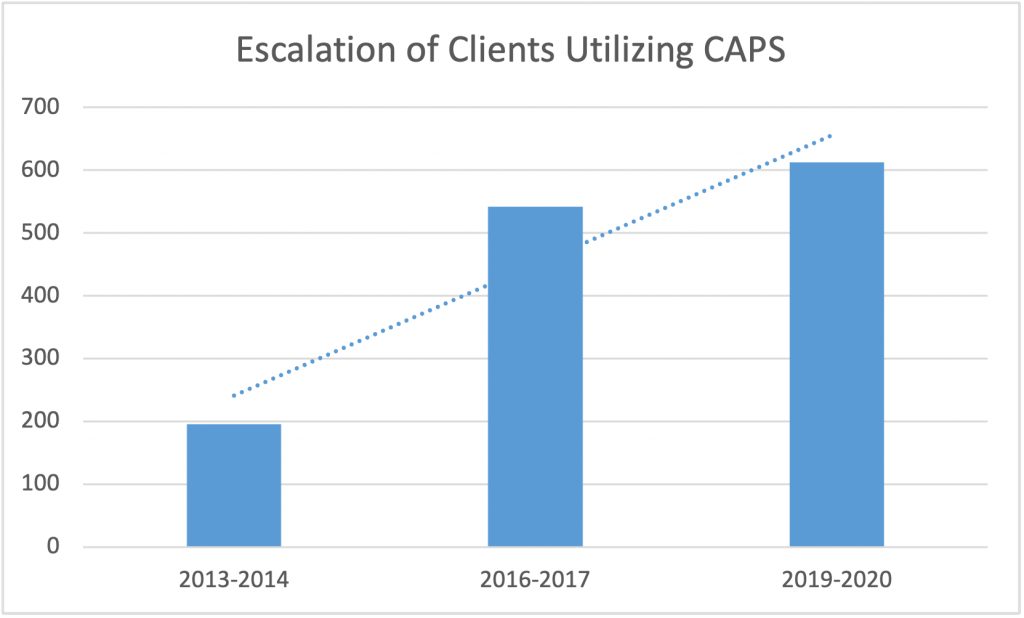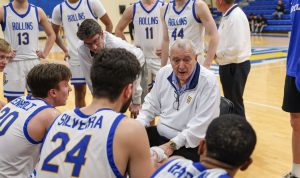
The number of students utilizing Counseling and Psychology Services (CAPS) at Rollins has steadily increased since 2013 and has increased by more than 50 percent since the beginning of the pandemic.
According to Director of Wellness Dr. Connie Briscoe and Director of Health Promotions Cristelle Garnier, approximately 520 students have utilized CAPS services since August 2021. For comparison, about 340 students used CAPS services from August to February last year, and about 380 students used CAPS services from August to February in 2019-2020.
Of the 520 students who have used CAPS services this year, 58 percent are new to CAPS, and 42 percent are returning students.
“This is a trend we are seeing nationally, so it is not unique to Rollins,” said Briscoe. “We have been doing a great job reducing the stigma around seeking help for mental health and increasing student awareness of the resources available to them. I think this has resulted in more students being aware of CAPS and feeling safe and able to seek out our support.”
Briscoe said that other reasons for the increased number of students using CAPS are that “mental health problems are in fact increasing somewhat in college populations” and that “increased access to services has allowed a greater number of students with mental health problems to make it to college.”
“Our demand for resources has consistently increased since the pandemic began,” Garnier and Briscoe said. “Currently, the most common pattern we are seeing is students seeking services for anxiety.”
This pattern is reflected nationally. A recent study at the University of Oxford discovered that one in three first-year students already have or have developed anxiety and depression in college. According to Mental Health America, 15 percent of the US’s youth experienced a major depressive episode within the last year, a two percent increase from last year.

Staffing in CAPS
The CAPS counseling staff consists of 15 counselors who are either full-time or part-time. Counselors currently serving students include four full-time, permanent counselors; four part-time, temporary counselors; one part-time substance misuse graduate assistant; one part-time clinical case coordinator; and five part-time clinical interns.
“Our clinical interns are well-educated and trained in mental health counseling and receive weekly supervision from our licensed mental health counselors,” said Garnier.
CAPS counselors specialize in different topics, including collegiate athletics, diversity and inclusion, substance misuse, and more.
“Some students have specialized needs, which makes [counselors’] experience and exposure to those needs indispensable,” Wellness Senator Perry Middleton (‘23) said.
Briscoe and Garnier said the Wellness Center was subject to a 15 percent budget cut in 2020 due to COVID-19. As a result, the position of Assistant Director of CAPS was removed in 2020 but was reinstated over the summer.
To make up for the budget cut, CAPS has applied for a second grant from the Substance Abuse and Mental Health Services Association (SAMHSA) for 2021-2024. The first grant was issued to the center in November 2018 to hire a clinical case manager, who provides information and advice to out-of-state students.
“We were successfully able to advocate for the addition of four part-time temporary CAPS counselors,” Garnier and Briscoe said. “We have requested that these be turned into permanent positions, but we are still waiting to find out if that is a feasible option for the campus.”
With more students using CAPS services, Middleton said that hiring more counselors should be a priority.
“I think most of the issues with CAPS are issues of resource allocation,” Middleton said. “I’ve had students come to me and say they were pushed into programs they didn’t feel were right by the Wellness Center. The center would be better suited to deal with increased students’ need with more therapists and resources at their disposal.”
What does CAPS include?
The Wellness Center offers interpersonal counseling groups, group workshops, individualized workshops, support spaces, self-help tools (like WellTrack and TogetherAll), the 24/7 Rollins Mental Health Helpline (407-646-1516), and referrals to other providers if necessary.
“We want students to be aware that CAPS is so much more than just individual counseling. We provide various outlets for mental health, such as support spaces, workshops, group counseling, and self-help tools,” said Garnier and Briscoe.
Before beginning treatment, counselors perform initial consultations to help identify which resources would be most helpful for each student.
“We often think about the students who do not utilize our services for various personal reasons, whether it has to do with upbringing, stigma around mental health, or lack of knowledge of the subject,” said Garnier and Briscoe. “Our goal is to make these services accessible for all students of various backgrounds and identities.”
Students do not have to call the Wellness Center to make an appointment, but can request CAPS appointments via an online form.







Comments are closed.